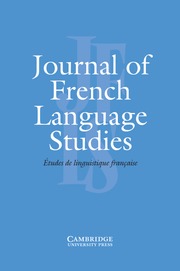Article contents
The origins of new quotative expressions: the case of Paris French
Published online by Cambridge University Press: 31 July 2018
Abstract
We analyse genre in the speech of young people with multi-ethnic friendship groups in Paris in order to address the as yet unresolved question of whether new quotatives equivalent in meaning to English BE LIKE result from simultaneous independent parallel developments in languages other than English or from a process of calquing. We conclude that French quotative genre results from independent internal developments, but that it enters the French quotative system in the same way that BE LIKE entered the English system, driven by the meanings of ‘similarity’ or ‘approximation’ that are shared by the lexical item genre in a range of syntactic categories. We propose that in order for a new similarity quotative to emerge, a lexical item with a meaning of ‘similarity’ or ‘approximation’ must become syntactically multifunctional, and that the use of that lexical item must reach a critical frequency threshold. In the case of genre we suggest that the necessary increase in frequency results from the development of the lexical item into a discourse marker. We also analyse another new French quotative, ETRE LA, a sequence that we find is used to highlight activity of many kinds (including, but not confined to, spoken behaviour). The trajectory followed by each of the new quotative expressions conforms to De Smet's proposals about how linguistic innovations spread through the grammar.
- Type
- Article
- Information
- Journal of French Language Studies , Volume 28 , Special Issue 2: Multicultural youth vernaculars in Paris and urban France , July 2018 , pp. 209 - 234
- Copyright
- Copyright © Cambridge University Press 2018
Footnotes
*We would like to thank David Adger, Penelope Gardner-Chloros, Devyani Sharma and three anonymous referees for helpful and encouraging comments on an earlier draft of this article.
References
REFERENCES
- 10
- Cited by


